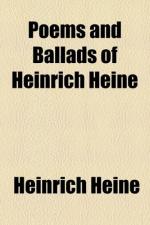|
This section contains 2,495 words (approx. 9 pages at 300 words per page) |

|
SOURCE: Kazin, Alfred. Foreword to Heinrich Heine: Poetry and Prose, Robert C. Holub and Jost Hermand, pp. vii-xiii. New York: Continuum, 1982.
In the following essay, a foreword to an edition of translated works by Heine, Kazin explores Heine's problematic omission from the modernist canon and the possible reasons for this exclusion.
In life (1797-1856) Heinrich Heine was generally admitted to be a superbly gifted but “difficult” man. In death his being “difficult” was so obstinately and even vindictively remembered that Hitler, flushed with triumph when he occupied Paris, ordered that Heine's grave in Montmartre be destroyed. This may have seemed extravagant to many “internal émigrés” in Germany at the time. But Heine was a problem and embarrassment to many Germans in the “educated classes.”
Today opinion of Heine in Germany is more relaxed, more appreciative, but it is also distracted. Although the complexity of his character, the...
|
This section contains 2,495 words (approx. 9 pages at 300 words per page) |

|


